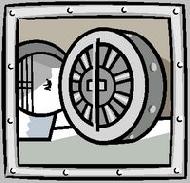
 |
|
| Financial Terms | |
| Replacement cycle |
|
Information about financial, finance, business, accounting, payroll, inventory, investment, money, inventory control, stock trading, financial advisor, tax advisor, credit.
Main Page: investment, inventory, credit, money, stock trading, payroll, accounting, inventory control, |
Definition of Replacement cycle
Replacement cycleThe frequency with which an asset is replaced by an equivalent asset.
Related Terms:Business cycleRepetitive cycles of economic expansion and recession. Cash conversion cycleThe length of time between a firm's purchase of inventory and the receipt of cash Cash cycleIn general, the time between cash disbursement and cash collection. In net working capital Expiration cycleAn expiration cycle relates to the dates on which options on a particular security expire. A Market cycleThe period between the 2 latest highs or lows of the S&P 500, showing net performance of a Operating cycleThe average time intervening between the acquisition of materials or services and the final Product cycleThe time it takes to bring new and/or improved products to market.  Replacement costCost to replace a firm's assets. Replacement valueCurrent cost of replacing the firm's assets. Replacement-chain problemIdea that future replacement decisions must be taken into account in selecting Stock replacement strategyA strategy for enhancing a portfolio's return, employed when the futures Budget cycleThe annual period over which budgets are prepared. Lifecycle costingAn approach to costing that estimates and accumulates the costs of a product/service over Replacement ValueThe amount necessary to duplicate a company's assets at current cycle timethe time between the placement of an order to life cycle costingthe accumulation of costs for activities that  manufacturing cycle efficiency (MCE)a ratio resulting from dividing the actual production time by total lead time; product life cyclea model depicting the stages through replacement costan amount that a firm would pay to replace an asset or buy a new one that performs the same functions as an asset currently held Replacement costThe cost that would be incurred to replace an existing asset with one having the same utility. cash conversion cyclePeriod between firm’s payment for materials Business CycleFluctuations of GDP around its long-run trend, consisting of recession, trough, expansion, and peak. Political Business CycleA business cycle caused by policies undertaken to help a government be re-elected. Real Business Cycle TheoryBelief that business cycles arise from real shocks to the economy, such as technology advances and natural resource discoveries, and have little to do with monetary policy. Payroll CycleThe period of service for which a company compensates its employees. Replacement Capital ExpendituresCapital expenditures required to replace productive Cycle countingThe frequent, scheduled counting of a subset of all inventories, Replacement partsParts requiring some modification before being substituted ReplacementThis subject of replacement of existing policies is covered because sometimes existing life insurance policies are unnecessarily replaced with new coverage resulting in a loss of valuable benefits. If someone suggests replacing your existing coverage, insist on having a comparison disclosure statement completed. Cash CycleThe length of time between a purchase of materials and collection of accounts receivable generated by the sale of the products made from the materials. Replacement ValueCost of acquiring a new asset to replace an existing asset with the same functional utility. Related to : financial, finance, business, accounting, payroll, inventory, investment, money, inventory control, stock trading, financial advisor, tax advisor, credit. |